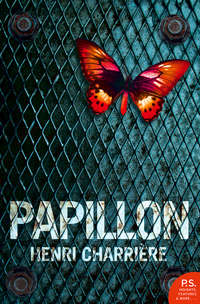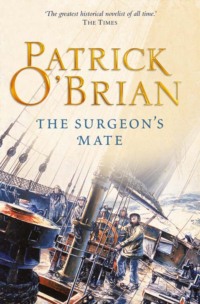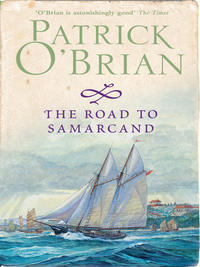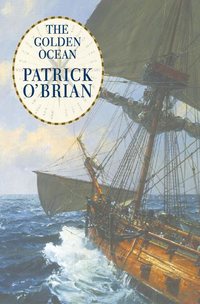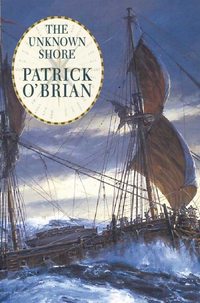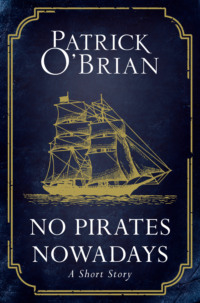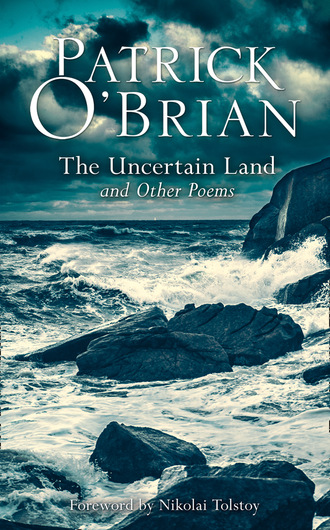
Полная версия
The Uncertain Land and Other Poems

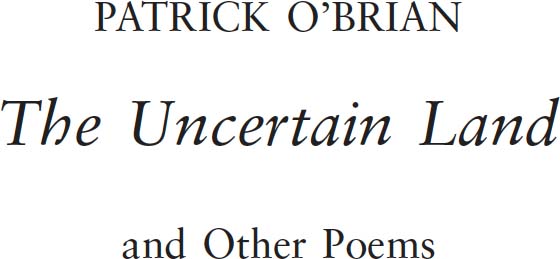

Copyright
Published by HarperCollinsPublishers Ltd
1 London Bridge Street
London SE1 9GF
www.harpercollins.co.uk
First published in Great Britain by HarperCollinsPublishers 2019
Copyright © The Estate of the late Patrick O’Brian CBE 2019
Foreword copyright © Nikolai Tolstoy 2019
Cover © Magdalena Russocka / Trevillion 2019
Cover layout design © HarperCollinsPublishers 2019
Patrick O’Brian asserts the moral right to be identified as the author of this work.
A catalogue copy of this book is available from the British Library.
All rights reserved under International and Pan-American Copyright Conventions. By payment of the required fees, you have been granted the non-exclusive, non-transferable right to access and read the text of this e-book on screen. No part of this text may be reproduced, transmitted, down-loaded, decompiled, reverse engineered, or stored in or introduced into any information storage and retrieval system, in any form or by any means, whether electronic or mechanical, now known or hereinafter invented, without the express written permission of HarperCollins.
Source ISBN: 9780008261344
Ebook Edition © March 2019 ISBN: 9780008261351
Version: 2019-02-28
Contents
Cover
Title Page
Copyright
Foreword by Nikolai Tolstoy
Part I: Poems
Blitz poetry
‘The sea and the sky are silent’
Mrs Koren
‘The harsh dry polished rattle’
‘You will come to it’
The Olive Harvest
The Inine
tibi donum offero
A present
French verses
Mal du pays
Le bois des oiseaux
Espagnols exilés
‘A dog bit his master’
Goat
Looking towards the south
Foxes surprised
Epitaph
February
The Deep Gold of a Pomegranate-Tree
The Cypress Tree
Meads no more
The Lagoon
A Lycéen
In Upper Leeson Street
How to lay a mine
The far side of the pass
August, Sun-impaled
Words from the bottom of a river
Croagh Patrick
A T’ang Landscape Remembered
Song
Farewell, my sin I have enjoyed you
A man under his impulsion
David danced before the ark
The falling of the leaves
Dear Mona Fitzpatrick ’32 (or ’3)
The theft
The electric light failing
Youth gone
Giving up smoking
Diego
Spaniards Exiled
The Captain and the Stock
To the hermitage and down, refreshed
Waiting for money in a far country
In Madame Ponsalié’s garden
Walk by the sea to see wonders
The raven
The young listless man
From the Welsh
Snowdon for the sunrise
The wine-dark sea
The bad day
Sterne
The Pleiades on Christmas Eve
The apology
Dead hours of louring justification, a desert of time
Myself a young man read a poem
The uncertain land
Silver-haired charm and urbanity
Winter in Foreign Parts
Obsèques
The dark figures
‘Is true the rat’
The duty of pleasure
Poulp: or, the Medusa a Toy
Grey and white
No smoking: the second day
Pray, Luv, forgive me my sourness
The Mandrake
For Louise’s visitors’ book
‘Clouds over clouds’
‘Walking on the high mountain’
‘Help my understanding, Lady’
‘Down through the vines’
Collioure
‘Long, straight, the steel lines’
‘If I could go back into my dream’
‘Loose-bellied, grey’
Old Men
‘When your lance fails’
Part II: Drafts
The Sardana for the First Time
‘Yesterday an old husband’
‘Whereas in Jewry came a star’
‘Not that a hard-roed herring should presume’
‘The pattering of rain’
‘The cry of buzzards in the sky’
‘Vicious intromission’
Forbear O Venus pray forbear
A halt on the Trans-Siberian
‘When my Muse and Chian Veins vie’
The sorrow & woe
Boars
Night walking
‘On the mountain I have quite a good sense of direction’
The True-born Englishman
‘Sun sloping through the cypresses’
Labuntur anni (The advancing years)
‘Peace; a great lawn that small, fat feet’
The hard winter
‘An old thin tall man’
What the hell do you know about poverty?
‘The north wind low over the house’
‘High on the cold mountain road’
‘I went out in a night of tearing wind’
‘A wheeling buzzard lifting to the sun’
‘Thoughts that range from anger and revenge’
‘Of France and of the knowledge of that land’
Captivity
‘When a dry heart sets a bleeding’
Loud-mouthed neighbours through the floor
‘For Jojo’s livre d’or 85’
Footnotes
Acknowledgements
Index of first lines
The Works of Patrick O’Brian
About the Publisher
Foreword
I do not know when Patrick first began composing poetry. However, I strongly suspect that it was during his frequently lonely adolescence, when he was cooped up largely alone in his father’s successive homes. He was from an early age a voracious reader. He was also a passionate devotee of the natural world, and during the three years he lived as an adolescent boy at Lewes in Sussex he spent long happy hours wandering along the banks of the nearby river Ouse, and along the sands of the beach below the towering white cliffs at Seaford. Much of his poetry is concerned with limpid depictions of animals, especially birds, and delicate descriptions of the landscape with which he was familiar.
The earliest specimens of his poetry to have survived are, in contrast, robustly humorous (even mildly erotic) – which will come as no surprise to readers of the Aubrey-Maturin epic. During the Blitz in 1940–41 he and my mother drove ambulances in Chelsea, which was heavily bombed by Luftwaffe aeroplanes offloading their remaining bombs before returning homeward above the moonlit Thames. Patrick entertained his fellow workers in the ambulance station at 18 Danvers Street by acting as unofficial bard of the unit. There he composed a lively anthem for the denizens of number 22 Station of the London Auxiliary Ambulance Service. He also concocted a poetic narrative recounting the nocturnal adventures of my mother’s faithful dachshund, Miss Patz, who sneaks out of her lodgings to join the regulars at the Black Lion pub around the corner from the ambulance station, and moves on to one of the many shady little drinking clubs which characterised the perilous Chelsea of those days. I suspect that Miss Patz’s exploits reflected in some degree those of her adventurous owner. My mother, in addition, assisted with the fluent German and French sections of the poem, being fluent in both languages.
For four years after the War my parents lived in a tiny cottage in the mountains of Snowdonia, where their fare depended in large part on Patrick’s skill with rod and gun. They were also avid followers of the local foxhounds, a hunt conducted on foot amid wildly dramatic mountain scenery. There, as Patrick’s novel Three Bear Witnessfn1 attests, he paid minute attention to landscape and wildlife. I find it hard to believe that he did not also commemorate them in poetry at the same time, although all of his muse that survives is his cheerful ode to a generous American lady who sent them tins of marmalade in 1946.
In 1949 he and my mother migrated to Collioure in the south of France. During the more rewarding decades which ensued, Patrick regularly jotted down poems in little notebooks and on odd sheets of paper. Among the earliest verse surviving from that period are allusions to the wild and rugged landscape they had left behind them, which was not dissimilar to that of the Pyrenees towering above the little town.
Many of Patrick’s salient characteristics are revealed in this collection: his recurring fear of death, love of local scenery, and careful perception of the patient labours of the local inhabitants. Although he was broadly apolitical, in his poem Espagnols exilés he manifests poignant sympathy for Spanish Republicans who had fled across the frontier in 1939, a residue of whom lingered on in Collioure after my parents’ arrival.
However, it should not be thought that his themes are all melancholy. He cherished a copy of Edward Lear’s poems, given to me by a fond great-aunt for my fourth birthday, which my mother abstracted shortly afterwards when she departed our family home to live with Patrick. ‘A dog bit his master’, composed not long after their arrival at Collioure, provides a fine specimen of Patrick’s love of the absurd.
In the following year he composed his poem ‘In Upper Leeson Street’, which nostalgically evokes his memorable stay in Dublin in 1937, where he completed his precocious novel Hussein. Although even in private he talked little about his former life (save, I assume, to my mother), it is clear that in his mind he dwelt much on their early days of adventurous privation, as well as images of people and places lovingly stored in his memory. The earliest allusions are to be found in the reverie ‘If I could go back into my dream’, which if I am not mistaken draws upon childish fancies of wild beasts frequenting the streets, areas, and corners of the London with which he was familiar when living there as a small boy of five.
Although Patrick devoted much care to poetic composition, much of it does not appear even to have been submitted for publication. Unlike his prose, which he generally looked upon with justified approval, he quite frequently expressed hesitant reservations about the value of his poetry. As he noted in his diary in October 1978, ‘More work on poems, but doubt keeps creeping in & as I wrote on one of them, simplicity can come v close to silliness’. But he was rigorously self-critical, and I for one find his poetry delightful.
He was strongly drawn to the genre, and possessed a particular penchant for the writings of Chaucer, which he possessed in Tyrwhitt’s handsome two-volume edition (1798). Time and again, when relaxing with a drink after the day’s labours were done, he would return to the ebullient Father of English Poetry with zestful pleasure. When I stayed with my parents in the days of my youth, we would follow supper by taking it in turns to read aloud our favourite poems accompanied by the shrilling of cicadas in the darkened vineyard. For some reason, this congenial practice was later abandoned, but it was doubtless continued when Patrick was alone with my mother.fn2
In September 1978 Patrick noted in his diary:
My poems discourage me: too personal, often too trifling. There are some I like that would do for general consumption but probably not enough to make a book.
However, he had earlier noted:
These last 2 days I’ve been looking through my poems, with the idea of picking out enough of those that do not make me blush for a volume: many I had quite forgotten & some surprised me agreeably.
Although he sent a batch shortly afterwards to his sympathetic literary agent Richard Scott Simon, only a handful saw the light of publication during Patrick’s lifetime. Now, however, this handsome collection has been brought together, containing both polished versions and drafts that for one reason or another were left in an unfinished state, which I do not doubt will give Patrick’s legion of admirers around the world the pleasure they afford me.
NIKOLAI TOLSTOY, 2018
Blitz poetry
Lines of unpredictable merit written on the back of Miss Patz, a rough-haired Dachshundin in the year of Grace a thousand nine hundred and forty-one, on Wednesday, the eighth day of January, at about half after one in the afternoon, it being a cold day, dismal with half molten snow.
The people of this [Chelsea ambulance] station are disconsolate and rude,
All English to the tonsils, and filled with British phlegm.
They blow their noses horribly, and between the blast is spewed
A flux of ghastly small-talk. Why, O God, did you make them?

Was there nothing else to please?
O Lord that gave us brandy
And lamb and fresh green peas

The last line is (I think) an Alexandrine,
which is very clever indeed, probably.

I inferior to a Spaniard? ¡No!
In dispraise of the Personnel of 22 St[ation].
L.A.A.S.fn1
The people of this station are disconsolate and rude
they are English to the tonsils, and with British phlegm embued
In proof of this opinion to their handkerchiefs I point
And not only to their kerchiefs, but oyster eyes and rheumy joint.
But also to their tempers, habitually vile
The fruit of grave distempers and coagulated bile.
All wart-hogs in comparison are quite high-souled and mild
Which leads to the conclusion that the better beasts are wild.
This may be sung (though the notion is grim)
To the tune of a well-known American hymn.
viz., or vide licet, if you should prefer the word
Mine eyes have seen the glory of the coming of the Lord …
[Miss Patz]
Patz went out in the dead of the night,
in the dead of the night went she.
But first she carefully put out the light,
And closed the door with a key.
[Miss Patz’s invitation to the pub]
Sie sagte sich «Im ein Augenblick»
Ich werde haben ein grosse Trink.
Und so in kleiner
Moment werdet in meiner
Turn, zwei-drei steiner
Sein, oder bier als wein.
Gut. Geh’ich nach Klub.
Nein; erst hab ich lust für ein Pub.
She went quite straight to the Lion called Blackfn2
Tossed down a quick pint, and never looked back
For a wicked old Owl, who took his dram raw
Determined to try the truth of the saw …
mark the Saw.
In wommin vinident [‘full of wine’] is no defence,
ðus knoweth lechours by experience.
Dan C[haucer].
So he plied her with whiskey, with gin and with rum
And said that he wished she would instantly come
To a very fine party to be held at a club
So complaisant and willing she then left the pub.
At the club she encountered a motley crew
Hard-drinking and raffish and lecherous too
They drank bottles of whiskey and magnums of gin
Till Patz felt uncertain what state she was in.
The Owl broke off in the midst of a tale
(It was singularly dirty – exclusively male)
And said ‘Liebe Fraülein, what makes you so pale?
Come, drink up a glass of red pepper and ale.’
She said ‘it’s my head, the air, heat and the smoke,’
And giggled like one who has just made a joke.
The Owl thought, ‘Aha, now may I eat grass,
But this is the time when I make the first pass.’
And through his foul mind there passed devious shapes
Of libidinous bitches and lecherous apes.
[Jetzt kommt er bei Patz,fn3
Und flüßtert ganz leise
‘Heraus liegt ein Auto,
Kommst Du für ein Reise?’
‘Ach nein! Du alt Teufel!
Wie kannst du mir’s fragen?
Ich weiß schon gehörts
L.C.C. dieser Wagon!’
Alors les autres
Se mettaient à rire
En se moquant de l’hibou
Qui ne savait quoi dire.
Il saisit d’un coup
Une bouteille de vin,
La vidait toute suite
Et la jettait du main.
‘Je paris’, dit-il,
‘Je ne quitterai pas
Avant que la chienne
Se sert dans mes bras’.]
‘The sea and the sky are silent’
The sea and the sky are silent:
they wait.
The sea and the sky are silent:
the girl is late.
The sea and the sky are silent:
the girl is late.
The sea and the sky are waiting:
let her come to her fate.
Mrs Koren
Couplets in favour of Mrs W. Koren, who sent (per JBC)fn1 jam to the O’Brians [at Collioure] in time of dearth
All Attic virtues, beauty, wisdom, wit,
Take which you will, she doth excel in it
All these and yet one more th’Atlantic dame
Hath to illumine her noble spouse’s name,
Mark there the Greek with Chian wine and oil
Comes bearing gifts, and see how vain his toil.
Yet here Transpontine Ceres freely sends
Imprison’d comfits, Polemarchus’ blends, …
And dreams not fear nor anger (see above)
But grateful intercessions and our love
The pallid bread glows purple, and the dew
Of anxious gleed bespreads each wizen’d brow
Encrimson’d mouths gape sated at the last
Such admirable tins of jam as these
Are apt to promote international pese
May Heaven reward Mrs Koren
Who is undoubtedly a pearl among women.
The recipient of jam were [sic] undoubtedly a moron
‘The harsh dry polished rattle’
The harsh dry polished rattle of the palm fronds
stirring in the breeze. I had supposed
But not our London sparrow, magpie, crow
Still less the stars by night, our Plough, old Bear
the same Orion, Rigal, Altair there
and through the trees the shining Procyon.
‘You will come to it’
You will come to it
Do not suppose their motions pantomime
because the thing they dig is dark, unseen
the mattock and the shovel swing in time
a near approach will show you what they mean.
The Olive Harvest
Cold from the silent leaden sky, unmoving, full of snow.
Cold, and the sounds far on the smoky air –
the rackle, hoe in stones, the stoney vineyard high
and the working man much farther than the sound
All through the terraced valley, sounds.
The vines are bare, the spare leaves redden:
they prune: and everywhere they grub with shining tools
And in the silence sounds – on silence beads, the sounds.
Now there are women.
gabbling
Where are the women? There
gabbling
above the road, the vines, the olives
the prim the graceful olive trees
the women picking there the olives
a tilted plane, the trees, the women
and then the sky, one-coloured, leaden.
Neat, clear, unworldly, Pieter Brueghel.
I do not like to see the women.
Black. Not shining. Black entirely.
head to foot, and cheesey faces.
Eager, hard and clacking voices: and the hands
are deadly white for ever groping,
They stand as high, and monstrously
they stand as high, as does the tree.
Their hands
are deadly white, for ever groping.
Emasculating
in the trees.
The Inine
The winter hillside
brown
sharp, clear, distinct
and figures running
tiny, shortened, struggling with space.
A plouff of smoke
is drifting on the field
larger: larger, vague: and now the bang
the echoes clapping in the hills, hard hills,
and now the rain
reversed: the rattle
cruel ripping tearing hail
of stones that fell
in time disturbed, before.
tibi donum offero
I am poor about loving, so
tibi donum offero
It is a present as you see
extractum ex operi
quod ex libro domini
extractum est, alas by me
theft it was, but theft or no
tibi donum offero.
A present
A present is chiefly a fragment, a token
of affection and love.
And then there is the strong pleasure of giving
a visible proof of unbroken
kindness and more
But, the interchanging pleasure apart
and discounted
A ring is a token of marriage; a book
of the spirit that made it.
and a present of love.
But the marriage is more than the ring
and the mind than the book.
French verses
Mal du pays
Les vignes, les chênes-lièges, oliviers et thym
les Catalans
le sein
vierge du Canigou



